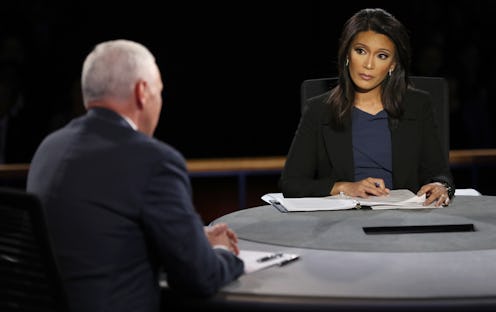The moderator of last night's vice presidential debate, Elaine Quijano, is not only the first Asian-American to moderate a national debate, but, at 42, the youngest journalist to sit in the moderator's seat since 1988. The CBSN anchor — who is also the first anchor from a digital show to take the stage at a debate — has an Emmy, served as a CNN White House correspondent across two presidential administrations, and has reported from the scenes of the Newtown shootings, Superstorm Sandy, and the Boston Marathon bombing. Quijano has lived an amazing and accomplished life, and her Monday night spent trying to keep the vice presidential candidates on task (as she valiantly tried to get them back on topic 27 times) will surely be just another of the many exciting chapters she has to look forward to in her career.
However, judging by Twitter and internet searches today, the questions America has after being introduced to Quijano aren't necessarily about what it feels like, say, to have been on the scene of some of the most devastating crimes of the 21st century. Though some Twitter commentary on Quijano rightly debated whether the moderator did enough to maintain control of the discussion between Pence and Kaine, or why she didn't ask Pence about his track record of pushing legislation that discriminates against LGBTQ people, some commentary seems fixated on questions that have nothing to do with Quijano's journalistic skills — and everything to do with her appearance.
On one hand, I'm not saying there's no place for humor in social media political conversations — in an election this fraught, I don't begrudge anyone for trying to find levity or relief, and many of the people complimenting Quijano's makeup artist or eyelashes were also clearly engaged with the debate and her work, and were simply taking a moment to have fun and be human. I get it.
But at the same time, it's tough to imagine a male moderator being treated the same way, even if he fit into a lot of conventional definitions of beauty. Focusing so intensely on the moderator's looks, even if the comments we're making are positive, still can have the effect of minimizing her other achievements (an issue many Twitter commentators were also obviously wrestling with).
Of course, not all the comments about Quijano's looks were respectful, politically engaged people taking a moment to show that respectful, politically engaged people can also have some thoughts about contouring and mascara usage. Some were unfortunately typical examples of people talking about a woman's looks to try to demean her:
This is all a sadly familiar dance, of course — women in the public eye getting unfairly critiqued for their looks is nothing new.
But this emphasis on asking the wrong questions is not only a product of Quijano's gender— though Quijano was definitely treated differently than first presidential debate moderator Lester Holt on a number of counts, two Google autofills, conducted today, for Quijano and Holt look wildly similar:
Why are we so interested in the personal lives of debate moderators? Maybe seeing them transform from anchors who deliver the news to people actively participating in making it happen make us curious about who they are as human beings, rather than as professionals. Maybe viewing them as people who suddenly have the power to lift up or crush our candidate sometimes makes us hungry for the kind of personal information that we believe can reveal secret biases. Is it good? Of course not; knowing if Quijano or Holt are married won't swing the election, or make any of us more informed voters.
But asking questions that help us better understand their professional backgrounds might. Why not ask about how Quijano's experiences as a journalist colored her abilities as a moderator — like how covering Newtown informed her questions about gun control, for example — or why she didn't ask about LGBTQ issues? Why not ask her anything about her actual work, instead of asking about her eyelashes and personal life? We're always going to have gripes and criticism about debate moderators, and there are always going to be small moments in the debate that make us love them and connect with their humanity; but focusing on their looks or personal lives doesn't need to play a role in that.
